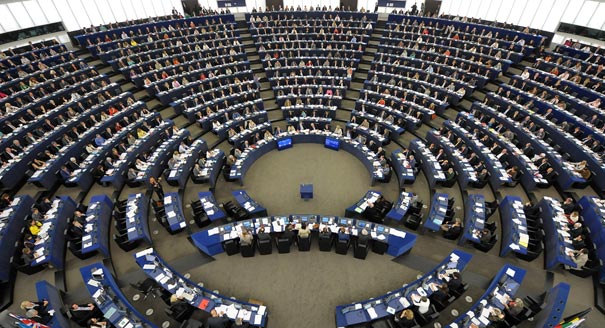Judy Dempsey
{
"authors": [
"Judy Dempsey"
],
"type": "commentary",
"blog": "Strategic Europe",
"centerAffiliationAll": "",
"centers": [
"Carnegie Endowment for International Peace",
"Carnegie Europe"
],
"collections": [],
"englishNewsletterAll": "",
"nonEnglishNewsletterAll": "",
"primaryCenter": "Carnegie Europe",
"programAffiliation": "",
"programs": [],
"projects": [],
"regions": [
"Europe",
"Eastern Europe",
"Western Europe"
],
"topics": [
"EU",
"Security",
"Foreign Policy"
]
}
Source: Getty
Judy Asks: How Can the European Parliament Strengthen EU Foreign Policy?
Three weeks before the European Parliament elections, representatives from across the political spectrum give their views on the assembly’s role in EU foreign policy making.
Three weeks before the European Parliament elections, representatives from across the political spectrum give their views on the assembly’s role in EU foreign policy making.
Elmar BrokChairman of the European Parliament Foreign Affairs Committee and member of the bureau of the Group of the European People’s Party
The most important aspect of the European Parliament’s role in foreign policy is to bring democratic legitimacy to decisions that affect the security and prosperity of EU citizens. The Lisbon Treaty provided instruments for a more effective EU foreign policy and enhanced the parliament’s powers of political control, budgetary authority, and legislation in this field. Parliamentarians use these instruments to create a climate of ongoing exchange with national parliamentary committees on foreign, security, and defense policy to make sure that European citizens’ voices are combined and heard throughout the union and the rest of the world.
In foreign policy, the European Parliament delivers political impetus and steering in an area where EU member states still make decisions on the basis of unanimity. The parliament’s procedure of adopting positions on the basis of a simple majority provides great potential, as was the case during the Arab Spring.
The European Parliament is directly elected by EU citizens, which gives it a clear mandate to use its powers to support the EU’s foreign policy high representative and the member states to develop more European foreign policy. That policy should be delivered in a cost-effective way that meets citizens’ desire for security during these turbulent times in the EU’s Eastern and Southern neighborhoods.
Ana GomesMember of the European Parliament Foreign Affairs Committee and member of the Group of the Progressive Alliance of Socialists and Democrats
The European Parliament has a duty to scrutinize the EU’s foreign policy and oversee the budget of its Common Foreign and Security Policy. The Lisbon Treaty increased the parliament’s powers and upgraded its responsibilities in the areas of foreign, security, and defense policy. Today, it would be unthinkable for the EU to undertake an overseas mission without parliamentary support.
Members of the European Parliament should hold EU foreign policy officials to account, especially the high representative but also the European commissioners for enlargement, humanitarian aid, and development. Yet the parliament must also do more to engage with other institutional actors and compel them to consult it. That applies to all activities and projects within the EU’s external relations remit as well as within all other policies with foreign policy implications. In areas such as international trade, energy, or industrial policy, for instance, the parliament must demand proper coordination, consistency, and coherence.
The parliament is already engaged in multiple areas and issues that are high on the union’s foreign affairs agenda. On Iran, the parliament pushed for the EU to use dialogue with the country’s new leadership as an opportunity to break new ground not only on the nuclear dossier but also on human rights and regional security. On Ukraine and Russia, the parliament was at the forefront of the EU’s visibility, with senior parliamentarians traveling to Kiev, calling for targeted sanctions, and providing institutional support for Ukraine.
The parliament has shown that it can speak up and urge EU member states and institutions to act when they drag their feet. In doing so, the parliament has scrutinized the union’s foreign policy in an increasingly useful way.
Rebecca HarmsMember of the European Parliament Delegation to the EU-Ukraine Parliamentary Cooperation Committee and co-chair of the Group of the Greens/European Free Alliance
The headlines on the Ukraine crisis underline that the EU needs a stronger, more united, and more coherent foreign policy.
On the whole, the monopoly of national governments and parliaments on EU foreign policy decisionmaking has not been challenged. The European Parliament need only be informed and consulted on the implementation of the EU’s Common Foreign and Security Policy, and the high representative has only to take the parliament’s view into account. Yet as the only directly elected EU institution, the parliament can provide added value to EU foreign policy.
Throughout the Ukraine crisis, the parliament has adopted resolutions on the situation in Kiev, following the Euromaidan protest movement, and in Crimea. But perhaps more important has been the parliament’s role in providing information to the Ukrainian electorate. Individual members of the European Parliament as well as relevant committees and delegations have organized hearings on the crisis. Parliamentarians who have been on the ground in Ukraine have reported back to the parliament on their findings.
This link between members of the Euromaidan movement in Kiev and other Ukrainian cities and EU citizens is essential to facilitate the formulation of a common position on these challenges and hence promote a more coherent EU foreign policy.
Marietje SchaakeSubstitute member of the European Parliament Foreign Affairs Committee and member of the Group of the Alliance of Liberals and Democrats for Europe
From trade to development, from EU enlargement to the budget, the European Parliament plays a key role in foreign policy. Five years after the Lisbon Treaty came into force, the parliament’s external relations role still has as much growth potential as the EU’s foreign and security policy itself.
The parliament not only has the duty to hold the EU’s foreign policy high representative and external relations commissioners to account. It is also in a unique position to build up a stronger EU on the global stage.
Parliamentarians have a key agenda-setting role and enjoy an optimal combination of access and freedom. They can meet prime ministers and activists, bloggers and political prisoners, without heavy protocol or constant press coverage. In third countries, they can create openings for dialogue or diplomatic crises alike; this only emphasizes their untapped potential.
As democratically elected representatives, members of the European Parliament often enjoy greater respect than unelected officials, especially when government-to-government relations are strained. Additionally, by organizing training courses and sharing knowledge with third countries’ political parties, parliamentarians can help foster the rule of law and a diverse political landscape.
The EU’s next foreign policy high representative and national foreign affairs ministers should liaise more actively with members of the European Parliament to make strategic use of them as the strong allies they are to develop the EU into a strong global player.
Charles TannockEuropean Conservatives and Reformists Group coordinator on the European Parliament Foreign Affairs Committee
The security threats facing the EU are more complex than ever. On issues such as the fight against terrorism, counteracting cyberwarfare, or reacting to emerging security and humanitarian crises, single EU member states often cannot act unilaterally to best effect.
A culture of cooperation on the EU’s common foreign, security, and defense policies allows member states to protect their mutual interests and act with greater efficacy. The EU’s Operation Atalanta off the coast of Somalia has proved successful in the global fight against piracy, while sanctions against Iran over its nuclear program have helped bring Tehran to the negotiating table.
The cases of Syria and Ukraine, however, have shown that the EU is ill equipped to act in times of crisis, as member states have differing interests. The European Parliament enjoys legislative co-decision powers in the areas of EU trade and aid policy and must vote on the budget of the European External Action Service and the civilian aspects of EU’s Common Security and Defense Policy. The parliament also holds hearings for all new EU ambassadors and special representatives, so it does enjoy real influence via its democratic scrutiny and oversight of EU foreign policy.
Nevertheless, Europeans must be mindful not to undermine the military primacy of NATO and the vital transatlantic link and always to appreciate the limits of EU power within that framework.
About the Author

Nonresident Senior Fellow, Carnegie Europe
Dempsey is a nonresident senior fellow at Carnegie Europe
- Europe Needs to Hear What America is SayingCommentary
- Babiš’s Victory in Czechia Is Not a Turning Point for European PopulistsCommentary
Judy Dempsey
Recent Work
Carnegie does not take institutional positions on public policy issues; the views represented herein are those of the author(s) and do not necessarily reflect the views of Carnegie, its staff, or its trustees.
More Work from Strategic Europe
- Taking the Pulse: Can European Defense Survive the Death of FCAS?Commentary
France and Germany’s failure to agree on the Future Combat Air System (FCAS) raises questions about European defense. Amid industrial rivalries and competing strategic cultures, what does the future of European military industrial projects look like?
Rym Momtaz, ed.
- Macron Makes France a Great Middle PowerCommentary
France has stopped clinging to notions of being a great power and is embracing the middle power moment. But Emmanuel Macron has his work cut out if he is to secure his country’s global standing before his term in office ends.
Rym Momtaz
- How Europe Can Survive the AI Labor TransitionCommentary
Integrating AI into the workplace will increase job insecurity, fundamentally reshaping labor markets. To anticipate and manage this transition, the EU must build public trust, provide training infrastructures, and establish social protections.
Amanda Coakley
- Can Europe Still Matter in Syria?Commentary
Europe’s interests in Syria extend beyond migration management, yet the EU trails behind other players in the country’s post-Assad reconstruction. To boost its influence in Damascus, the union must upgrade its commitment to ensuring regional stability.
Bianka Speidl, Hanga Horváth-Sántha
- Taking the Pulse: Can the EU Attract Foreign Investment and Reduce Dependencies?Commentary
EU member states clash over how to boost the union’s competitiveness: Some want to favor European industries in public procurement, while others worry this could deter foreign investment. So, can the EU simultaneously attract global capital and reduce dependencies?
Rym Momtaz, ed.









